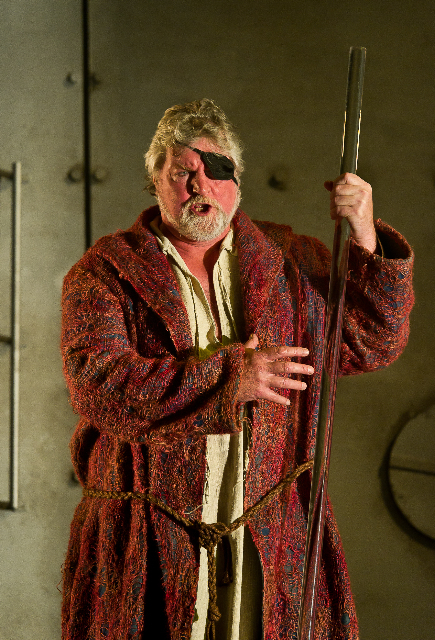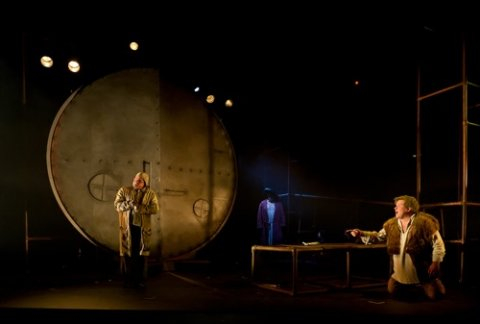Siegfried, Longborough Festival | reviews, news & interviews
Siegfried, Longborough Festival
Siegfried, Longborough Festival
Wagnerite heaven in Gloucestershire - small stage, big impact
Longborough has its Mozart (this season a not wildly exciting Così fan tutte), and it has its Verdi (this year Falstaff). But its real heart is in Wagner, and in particular The Ring, now – in its third year – up to Siegfried. Wagnerites infest the car parks and the picnic lawns. The man who borrowed our corkscrew at supper time had seen six operas in one week at Bayreuth, and on his one night off had gone to Munich to see Rienzi, the longest Wagner night of the lot. Longborough is decidedly his kind of place.
Removing one’s rose-tinted specs, it’s easy enough to find fault with this or that aspect of mature Wagner done in a converted barn with 500 seats. The stage is too small, the pit (though recently enlarged) seats 65 compared with Wagner’s 105, and so forth. But with music-making of this quality, one can easily forget about such problems. Anthony Negus, an experienced Wagnerian who has had too few opportunities to put his enthusiasm into practice in public performance, conducts a taut, beautifully paced, finely balanced reading of a score that certainly doesn’t play itself in any sense. The small theatre perhaps inhibits the music’s spread and sense of space, but on the whole it helps the singers. In fact this is the most singer-friendly Wagner I’ve heard outside Bayreuth, a theatre specifically designed to cope with the problem. And the cast is practically without a weakness.
At its head is a young American Siegfried, Daniel Brenna (main picture), who as far as I know is completely new to the British stage. From his first “Hoi-ho” it’s instantly apparent that he’s a Wagner tenor of outstanding promise, a natural with a brilliant, easy top to the voice that half-recalls Melchior, strong projection throughout the range, excellent German and a completely unforced stage presence. His acting is still raw, and he needs more disciplined direction than he gets here. But it’s great to hear this difficult, taxing music sung so uninhibitedly, and without a trace of exhaustion to the very last phrase of his final-act duet with Alwyn Mellor, who herself sings Brünnhilde with radiant tone and vivid dramatic intensity.
 Opposite Brenna in the first two acts is the Mime of Colin Judson, a clever, witty character tenor, more likeable, maybe, than this slimy, manipulative dwarf should be, brilliantly watchable in his scene with the Wanderer (Philip Joll), voice and face reflecting exactly the ebb and flow of the riddles which will in the end cost him his life.
Opposite Brenna in the first two acts is the Mime of Colin Judson, a clever, witty character tenor, more likeable, maybe, than this slimy, manipulative dwarf should be, brilliantly watchable in his scene with the Wanderer (Philip Joll), voice and face reflecting exactly the ebb and flow of the riddles which will in the end cost him his life.
Joll himself (pictured right), a voice from the past in this role as far as I’m concerned, turns out to be still in fine fettle, superb especially in his third-act confrontations with Erda and Siegfried – the only music Wagner wrote for the Ring’s ambiguous, Zeus-like hero after picking the work up again post-Tristan and Meistersinger. And this scene is also a highlight of Alan Privett’s otherwise patchy production, Evelyn Krahe’s Erda admirably statuesque, dark-voiced, but beautiful enough, in a cadaverous sort of way, to make Wotan’s fathering of Brünnhilde on her perfectly understandable.
Nicholas Folwell, also rather well directed, remains one of the best Alberichs imaginable: a dark, virile baritone, remorseless in his exposure of Wotan’s hypocrisies, yet in an odd way vulnerable, his complaints at the bad hand dealt him by fate made to sound all too plausible despite their obvious emptiness. He would, one feels, sue if he sprained his ankle kicking someone. And he would lose.
Nature, such a crucial aspect of Wagner’s dramaturgy, is nowhere to be seen
Like many modern directors, Privett (with designer Kjell Torriset) rejects the great outdoors in favour of quasi-interiors littered with bric-a-brac, not all of it obviously relevant to the plot in hand, so that an already cramped stage becomes an obstacle course of gantries and scaffolding, criss-cross ramps, and in the first act a huge furnace door, far downstage, which also oddly enough serves as an entrance and exit.

Brünnhilde’s rock, for no apparent reason, is backed by a vast window. Nature, such a crucial aspect of Wagner’s dramaturgy, is nowhere to be seen. Fafner the dragon, grandly sung by Julian Close, trundles on atop a cherry-picker scaffold tower, a most disappointing adversary for our eager young hero; the Woodbird is a pretty singing dancer, Allison Bell, not very feathered, though mildly avian in tone and tuning.
The entire action is haunted, not to say crowded out, by a trio of black-clad dancers representing the three Norns (how this will work next year in Götterdämmerung, where they will have to sing, remains to be seen). Their most useful function is to distribute props when necessary, like clever automatons in a designer kitchenette. But like automatons, they soon get in the way and on one’s nerves.
Oh, for a bit of space and a leaf or two. Brünnhilde’s horse Grane, we hear, has found some grass on the mountain. But that’s offstage. The irony is perhaps deliberate. It’s the music, though, that takes the cake.
- Siegfried at Longborough Opera Festival on 28 and 30 July
The future of Arts Journalism
You can stop theartsdesk.com closing!
We urgently need financing to survive. Our fundraising drive has thus far raised £49,000 but we need to reach £100,000 or we will be forced to close. Please contribute here: https://gofund.me/c3f6033d
And if you can forward this information to anyone who might assist, we’d be grateful.

Subscribe to theartsdesk.com
Thank you for continuing to read our work on theartsdesk.com. For unlimited access to every article in its entirety, including our archive of more than 15,000 pieces, we're asking for £5 per month or £40 per year. We feel it's a very good deal, and hope you do too.
To take a subscription now simply click here.
And if you're looking for that extra gift for a friend or family member, why not treat them to a theartsdesk.com gift subscription?
more Opera
 Falstaff, Glyndebourne review - knockabout and nostalgia in postwar Windsor
A fat knight to remember, and snappy stagecraft, overcome some tedious waits
Falstaff, Glyndebourne review - knockabout and nostalgia in postwar Windsor
A fat knight to remember, and snappy stagecraft, overcome some tedious waits
 Salome, LSO, Pappano, Barbican review - a partnership in a million
Asmik Grigorian is vocal perfection in league with a great conductor and orchestra
Salome, LSO, Pappano, Barbican review - a partnership in a million
Asmik Grigorian is vocal perfection in league with a great conductor and orchestra
 Semele, Royal Opera review - unholy smoke
Style comes and goes in a justifiably dark treatment of Handelian myth
Semele, Royal Opera review - unholy smoke
Style comes and goes in a justifiably dark treatment of Handelian myth
 Le nozze di Figaro, Glyndebourne review - perceptive humanity in period setting
Mostly glorious cast, sharp ideas, fussy conducting
Le nozze di Figaro, Glyndebourne review - perceptive humanity in period setting
Mostly glorious cast, sharp ideas, fussy conducting
 Fidelio, Garsington Opera review - a battle of sunshine and shadows
Intimacy yields to spectacle as Beethoven's light of freedom triumphs
Fidelio, Garsington Opera review - a battle of sunshine and shadows
Intimacy yields to spectacle as Beethoven's light of freedom triumphs
 Dangerous Matter, RNCM, Manchester review - opera meets science in an 18th century tale
Big doses of history and didaction are injected into 50 minutes of music theatre
Dangerous Matter, RNCM, Manchester review - opera meets science in an 18th century tale
Big doses of history and didaction are injected into 50 minutes of music theatre
 Mazeppa, Grange Park Opera review - a gripping reassessment
Unbalanced drama with a powerful core, uninhibitedly staged
Mazeppa, Grange Park Opera review - a gripping reassessment
Unbalanced drama with a powerful core, uninhibitedly staged
 Saul, Glyndebourne review - playful, visually ravishing descent into darkness
Ten years after it first opened Barrie Kosky's production still packs a hefty punch
Saul, Glyndebourne review - playful, visually ravishing descent into darkness
Ten years after it first opened Barrie Kosky's production still packs a hefty punch
 Così fan tutte, Nevill Holt Festival/Opera North review - re-writing the script
Real feeling turns the tables on stage artifice in Mozart that charms, and moves
Così fan tutte, Nevill Holt Festival/Opera North review - re-writing the script
Real feeling turns the tables on stage artifice in Mozart that charms, and moves
 La Straniera, Chelsea Opera Group, Barlow, Cadogan Hall review - diva power saves minor Bellini
Australian soprano Helena Dix is honoured by fine fellow singers, but not her conductor
La Straniera, Chelsea Opera Group, Barlow, Cadogan Hall review - diva power saves minor Bellini
Australian soprano Helena Dix is honoured by fine fellow singers, but not her conductor
 The Queen of Spades, Garsington Opera review - sonorous gliding over a heart of darkness
Striking design and clear concept, but the intensity within comes and goes
The Queen of Spades, Garsington Opera review - sonorous gliding over a heart of darkness
Striking design and clear concept, but the intensity within comes and goes
 The Flying Dutchman, Opera Holland Park review - into the storm of dreams
A well-skippered Wagnerian voyage between fantasy and realism
The Flying Dutchman, Opera Holland Park review - into the storm of dreams
A well-skippered Wagnerian voyage between fantasy and realism

Add comment